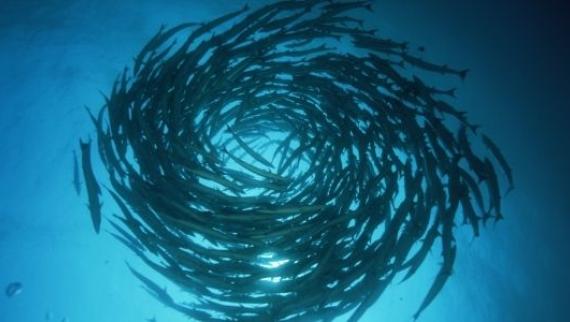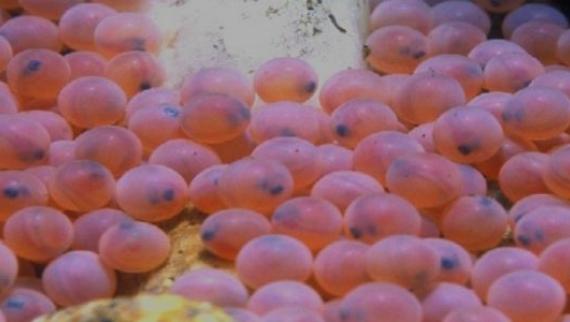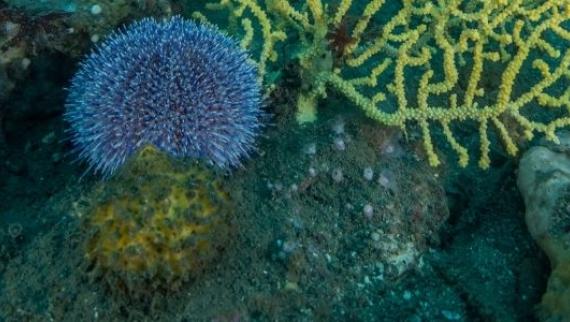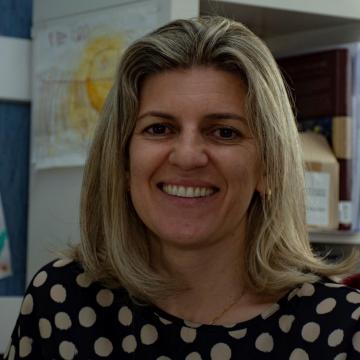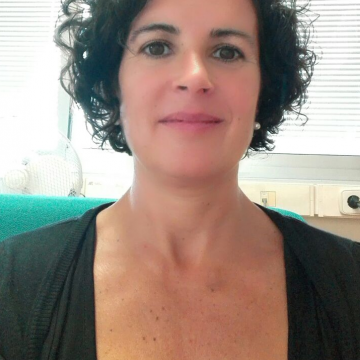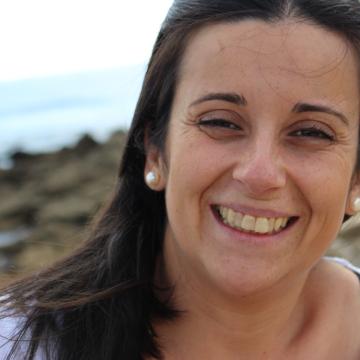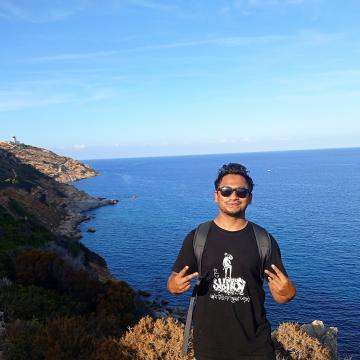Marine Molecular Pathobiology
Pathobiology refers to the study of the biologic processes behind diseases.
The IIM's Marine Molecular Pathobiology group applies molecular and cellular methods to develop basic studies of the biology of diseases in marine organisms, specifically in molluscs. They then use their fundamental research to improve marine aquaculture sustainability and performance.
The group's research proposal merges a set of genetic and epigenetic tools together with microscopy and molecular biology to identify the agents causing the diseases, analyze host-pathogen interactions and study the activation and modulation of defense and resistance processes. They strive to understand the role of differential gene expression and its connection to the origin of the disease, advancing towards a more individualized disease management.
The group develops two main lines of work. On the one hand, they focus on early development in cephalopods, studying the genetic and molecular processes related to early development in mollusc species with potential for aquaculture. On the other, they dive into the genetic, environmental and nutritional regulatory processes related to the immune system and to the host-pathogen relationship.
Other interests of the Marine Molecular Pathobiology group range from the search of new bioactive products in cephalopod mucus and ink proteins (i.e., looking for new bacteriocidal agents) to the evaluation of the self-regenerative capabilities of this group of molluscs, including their potential for own vs. alien tissue recognition when facing the assimilation of tissue grafts.
In addition, the research team aims to transfer their knowledge, technology and data to allow easily applying their findings to basic research, thus ensuring a high-value relationship between investment and impact of their applied research.
- OCTOWI -
<p>Programa Ciencias Mariñas: Avances no benestar do polbo na acuicultura: Determinación de Indicadores Operativos de Benestar</p>
Principal investigator:GestalMateoMaría CaminoFunding body:El Programa de Ciencias Mariñas de Galicia es 1 de los 5 programas de Ciencias Marinas de los Planes Complementarios de I+D+I del Plan de Recuperación Transformación y Resilencia. Financiado por FEMP/FEMPA.Funding for IIM-CSIC:68662€Go to project pageFromto - BiReMARK -
<p>Programa Ciencias Mariñas: Identificación de biomarcadores moleculares de aspectos clave no ciclo reprodutivo dos moluscos bivalvos</p>
Principal investigator:DiosVidalSoniaFunding body:El Programa de Ciencias Mariñas de Galicia es 1 de los 5 programas de Ciencias Marinas de los Planes Complementarios de I+D+I del Plan de Recuperación Transformación y Resilencia. Financiado por FEMP/FEMPA.Funding for IIM-CSIC:97750€Go to project pageFromto - INMUNOCTOPUS -
<p>IMMUNITY IN COMMON OCTOPUS: NON-SELF RECOGNITION AND IMMUNE RESPONSE INDUCED BY PATHOGENS</p>
Principal investigator:GestalMateoMaría CaminoFunding body:Proyecto PID2020-119906GB-I00 financiado por MCIN/ AEI /10.13039/501100011033Funding for IIM-CSIC:120000€Go to project pageFromto <p>Impacto de factores estresantes en los ecosistemas costeros</p>
Principal investigator:CobeloGarcíaAntonioFunding body:Ayudas cofinanciadas con fondos de la Agencia Gallega de Innovación de la Xunta de GaliciaFunding for IIM-CSIC:75000€Go to project pageFromto- STRAUSS -
<p>EFFECTS OF OCEAN WAVES IN THE RIAS BAIXAS UPWELLING SYSTEM: SURFACE DYNAMICS ON SELECTED BIOLOGICAL CASE STUDIES</p>
Principal investigator:GilCotoMiguelFernándezBabarroJose ManuelFunding body:Proyecto PID2019-106008RB-C21 financiado por MCIN/ AEI /10.13039/501100011033Funding for IIM-CSIC:221000€Go to project pageFromto
- Varó, I.; Prado-Álvarez, M.; Ortea, I.; Morales, A.E.; García-Fernández, P.; Domingues, P.; Tur, R.; Dios, S.; Gestal, C. (2022) Proteogenomic Study of the Effect of an Improved Mixed Diet of Live Preys on the Aquaculture of Octopus vulgaris Paralarvae FRONTIERS IN MARINE SCIENCE DOI:10.3389/fmars.2021.817701
- Fernández-González, L.E.; Sánchez-Marín, P.; Gestal, C.; Beiras, R.; Diz, A.P. (2021) Vitellogenin gene expression in marine mussels exposed to ethinylestradiol: No induction at the transcriptional level Marine Environmental Research DOI:10.1016/j.marenvres.2021.105315
- Mathur, V.; Kwong, W.K.; Husnik, F.; Irwin, N.A.T.; Kristmundsson, Á.; Gestal, C.; Freeman, M.; Keeling, P.J. (2021) Phylogenomics Identifies a New Major Subgroup of Apicomplexans, Marosporida class nov., with Extreme Apicoplast Genome Reduction Genome Biology and Evolution DOI:10.1093/gbe/evaa244
- Prado-Alvarez, M.; García-Fernández, P.; Faury, N.; Azevedo, C.; Morga, B.; Gestal, C. (2021) First detection of OsHV-1 in the cephalopod Octopus vulgaris. Is the octopus a dead-end for OsHV-1? Journal of Invertebrate Pathology DOI:10.1016/j.jip.2021.107553
- Colunga-Ramírez, G.E.; Martínez-Aquino, A.; Flores-López, C.A.; Gestal, C.; Azevedo, C.; Castellanos-Martínez, S. (2021) Aggregata polibraxiona n. sp. (Apicomplexa: Aggregatidae) from Octopus bimaculatus Verrill, 1883 (Mollusca: Cephalopoda) from the Gulf of California, Mexico European Journal of Protistology DOI:10.1016/j.ejop.2021.125825
- TFM - Imran Abdus Shukur (12/09/2022) Título: Insights into common octopus (Octopus vulgaris) ink proteome and bioactive peptides using proteomic approaches University of Liege
- TFM - SARA PÉREZ POLO (26/07/2022) Identifying natural bioactive peptides from the common octopus (Octopus vulgaris Cuvier, 1797) skin mucus by-products using proteogenomic analysis UNIVERSIDAD DE CADIZ (UCA)
- TFG - Andrea González Alonso (22/07/2022) Estudio de la capacidad de respuesta inmune del pulpo común frente a distintos inmunoestimulantes Univerdidad de Vigo (UVigo)
- TFM - Laetitia Martins Fernandes (21/01/2022) Análise da expressão de genes biomarcadores de bem-estar por hibridização in situ de ARN em paralarvas de cultivo (Octopus vulgaris Cuvier, 1797) Escola Superior de Turismo e Tecnologia do Mar do Instituto Politécnico de Leiria,
- PhD - Pablo García Fernández (20/01/2022) Estudio de la fase larvaria planctónica del pulpo común, Octopus vulgaris Cuvier, 1797 frente a distintas condiciones de cultivo mediante el empleo de tecnologías ómicas e identificación de genes biomarcadores Universidade de Vigo (UVIGO)
- Capabilities | Development of management and decision-making tools based on modeling and simulated scenariosCoastal & Environmental Protection Maritime Spatial Planning Ecosystem Services & Governance Aquaculture Fisheries
Development of space-specific tools for assessment, management and decision-making by modeling the impacts of present and possible future environmental scenarios (pollution, climate change, etc.) on oceanographic conditions, biodiversity distribution, physiological response or fisheries and aquaculture performance.
- Capabilities | Development and optimization of aquaculture systems for traditional and new farmed species
Development of integrated culture techniques for new aquaculture species, as well as optimization of traditional ones based on different approaches (i.e. early development, handling, feeding, disease and immune responses, ecophysiological performance, or ecosystem carrying capacity) to improve animal welfare, yield and sustainability in global marine aquaculture.
- Capabilities | Prospection of new bioactive compounds
Prospection of new bioactive compounds in marine organisms and food industry by-products, including characterization of their activity and validation of their application in different sectors (health, cosmetics, nutrition, etc.).
- Capabilities | Development of bioindicators for environmental monitoring
Characterization and measurement of micro-physiological responses or molecular markers generated in response to environmental conditions for the development of an early warning system for environmental perturbations.
- Capabilities | Advanced -omics applied to marine organisms
Studies on the structure of the genome of marine organisms, including gene mapping, DNA sequencing and how the complete set of RNA transcripts is produced by the genome and affected by development, diseases, or environmental factors conditioning the phenotype and particularly proteomics and metabolomics, always applying the most advanced techniques (ATAC-seq, MethylCap-Seq, RNA-seq, recombinant DNA technology, knockin and knockout CRISPR/Cas9, enhancer detector (ZED),Tol2 kit and BAC transgenic technologies, etc.).
- Patent | Method for the identification of antimicrobial polypeptides in Mytilus edulis
Authors: María del Mar Costa Portela, Beatriz Novoa García, Antonio Figueras Huerta, Sonia Dios Vidal, Camino Gestal Mateo
The invention provides a method for the identification of polynucleotides, coding precursors of polypeptides, with antibacterial and antiviral activity (myticines and mytilines). More detailed information can be obtained here.

